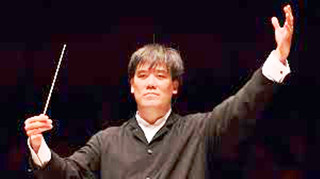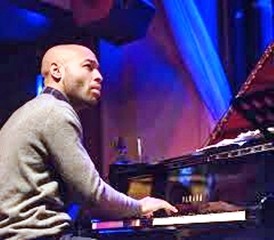|
Back
Fascinatin’ Gershwin New York
David Geffen Hall, Lincoln Center
09/21/2016 -
John Corigliano: STOMP for Orchestra (New York premiere)
George Gershwin: Concerto in F for Piano and Orchestra
Antonín Dvorák: Symphony No. 9 in E minor (“From the New World”), Opus 95
Aaron Diehl (Pianist)
New York Philharmonic Orchestra, Alan Gilbert (Conductor)

A. Gilbert (© New York Philharmonic)
The Star Spangled Banner was hardly necessary to start the Opening Gala Concert of the New York Philharmonic last night. Not because the work was written by a slave-holder, not because the third stanza referred to catching runaway “Negroes”, not because the New York Philharmonic is an international orchestra.
But because New York, New York would have been more appropriate. All three works were premiered in New York. John Corigliano grew up here, the scion of the New York Phil’s Concertmaster; George Gershwin was Manhattan through and through, and his Concerto was premiered down the block in Carnegie Hall by the predecessor or the New York Phil. And Antonín Dvorák, outside of a few trips to Iowa (one of the only frequent-visitors who wasn’t running for President), loved New York, its orchestra, its students.
And while the theme of “New World” was an original, it was probably based on a tune supplied by Harry Burleigh, who lived most of his life here.
So this opening of the Phil–and very sadly the closing season for Conductor Alan Gilbert–was a tribute to New York City. It lacked any musical challenges for the audience, it was basically “comfortable” music, the Alan Gilbert tenet of “Hey, you blasé audience, feast your ears on this piece.” But the Phil sounded in reasonably good form, and their piano soloist in his New York Phil debut, was a terrific artist.

A. Diehl (© aarondiehl.com)
Aaron Diehl is a multi-faceted musician: as arranger, classical and jazz pianist, conductor, collaborator with luminaries like Philip Glass. But it was his performance of George Gershwin’s F Major Concerto which exhibited a beauty rarely heard in the work.
After Lang Lang’s jazzed up Rhapsody in Blue several years ago, I stopped listening to Gershwin’s orchestral pieces. Mr. Diehl, though, made Gershwin sound like Chopin–warts and all.
Not even Alan Gilbert could sew those clumsy linking tunes together. Like Chopin, Gershwin was the ultimate melodist, and a 30-minute work did not come easily to him. Yet he plunged away on theF Major, doing his own orchestration (unlike the Rhapsody), starting off like Beethoven’s Violin Concerto some timpani taps, and then allowing the tunes to take him down the right path.
The way Mr. Diehl played them was to allow the music to sing. The themes were conservatively jazzy when necessary, on the cusp of the sentimental (though never near the maudlin theme of Rhapsody) but always with the surefire melodies which Ravel and Schoenberg loved and about which any 19th Century composer would have been jealous.
And while the bookend movements were good–Mr. Diehl’s fingerwork in the finale was never showoff, but inevitably astonishing–it was the Adagio center which showed him and the music at its best. Matthew Muckey’s trumpet solo was never jazzy, but always coolly 1930’s Manhattan, and that led to piano music which was more than fluent. It sung cantabile, it delved into some dark moments and came up singing more. Had Chopin grown up in Brooklyn, this would have been his music.
Except that Gershwin needed no comparisons. He may not have been a natural concerto-writer, but his melodies were so charged with feeling–far apart from his Broadway tunes–that Mr. Diehl let the notes do the talking. And this morning, thinking of those last measures, that recapitulation of the world piece, I know that Gershwin created them in the sunlight of a early autumn day.
The evening began with one of John Corigliano’s less important works. STOMP sounds like an Aaron Copland title, but it stemmed from a piece for solo violin written by the composer for the Tchaikovsky Violin Competition. That one had its challenges in string re-tuning and stamping feet by the competitors. This orchestral version was purely American: string swoops, brassy shouts, foot-stomping, square-dance rhythms.
It was too short. The orchestra was only starting to get its energies up, when it was over in seven minutes. But pleasant enough.
The last half was devoted to Dvorák’s “New World”, hardly challenging, and conducted with Alan Gilbert’s usual facility. It was difficult to find fault. It was also difficult to recall this morning.
Yet this is going to be the Phil’s Year of Dvorák, and one looks forward to the rarer works scheduled. Even more important, the corridor outside is filled with the most wonderful memorabilia of the man. So much information, in fact, that anybody who stands in line for a drink-and-a-shmooze will be missing the odd and eccentric about this so well-loved composer.
Harry Rolnick
|